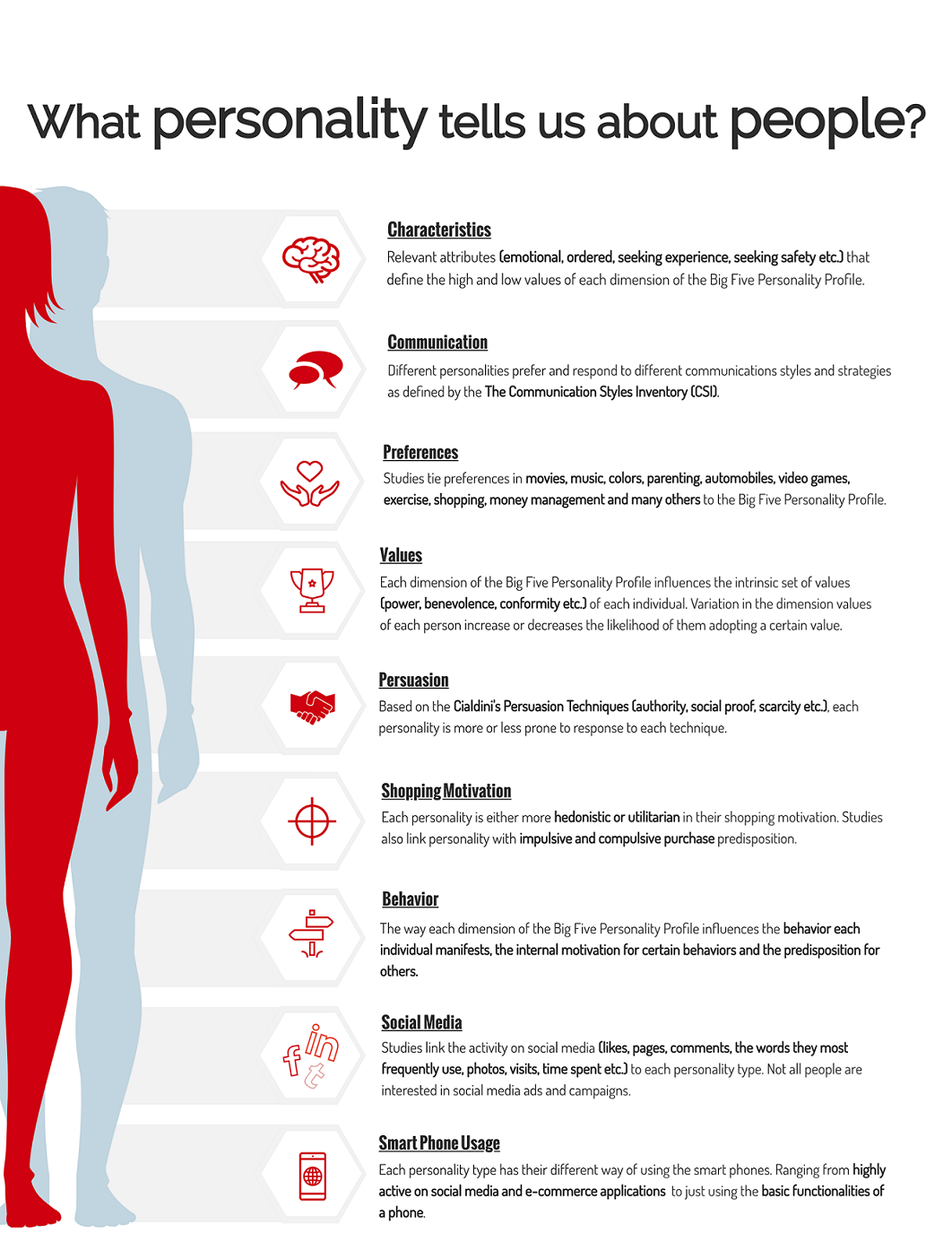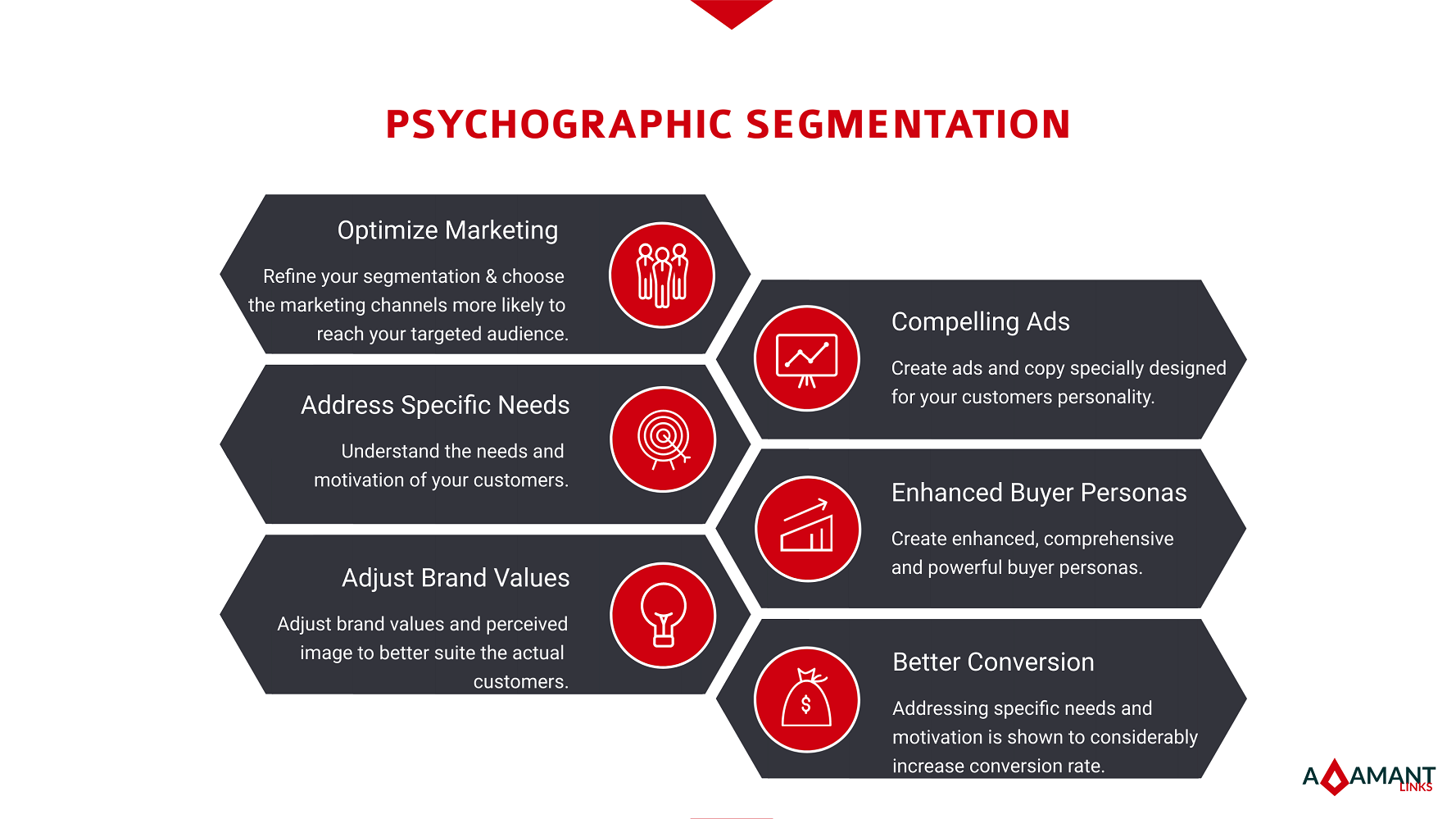by Vlad Ungureanu
Jul 2020
Key takeaways from this article!
Psychographic segmentation refers to the classification of people according to their attitudes, aspirations, and other psychological criteria.
By understanding your potential customers, you can address specific needs and preferences, create compelling ads, enhance your customer persona and get better conversion rates.
In order to define your psychographic segments, you can use: customer interviews, surveys, focus groups, marketing research companies and Adamant Links Analytics.
Psychographic Segmentation
Psychographics refers to the study and classification of people according to their attitudes, aspirations, and other psychological criteria, especially in market research.
Psychographics have been applied to the study of personality, values, opinions, attitudes, interests, and lifestyles. Considering that the main goal of marketing is to convince people to buy your products or services, psychographics provides an effective way to tailor campaigns, ads and messages with the highest success rate for each psychographic segment.

Adamant Links - What Personality Tells Us About People
Using the Big Five/OCEAN model for psychographics segmentation provides access to the following characteristic of each personality:
- School Performance
- Preferred Occupation
- Individual Characteristics
- Internal Values
- Lifestyle
- Preferences (movies, literature, art styles, games, music, cars)
- Motivation and Shopping Motivation
- Decision Making Process
- Communication Style
- Most Commonly Words Used
- Social Media Behaviour and Preferences
- Smartphone Usage
- Preferred Brand Personalities
- Specific Marketing Strategies
- Most Efficient Marketing Channels
- Preferred Design Elements in Websites
- Preferred Fonts
- Preferred Image Content and Composition
- Preferred Fonts
- Preferred User Interface Elements

Adamant Links - Psychographic Segmentation
Enhanced Customer Persona
Understanding the psychological traits that define each market segment provides an efficient way to improve almost every aspect related to your marketing campaigns and strategies. Psychographics segmentation provides an unprecedented way to understand the values, motivation, decision making, needs, desires and behaviour of your potential customers. For example, people that score high in Extroversion are more likely to be interested in sports, while people high in Agreeableness are less likely to be interested in sports.
Address specific needs
Based on the Big Five/OCEAN traits, some personalities prefer novelty while others are stable and predictable; people high in Neuroticism are insecure and cautious while people high in Extroversion are adventurous and confident. Understanding each segment allows you to address specific needs, leading to higher engagement from your potential customers.
Compelling Ads
Not only can you target specific needs, but psychographics provides information on how to phrase your message, what images to use, the colours each segment prefers, what persuasion techniques work best for each segment and even the font they are more likely to appreciate.
Optimize Marketing
There is a strong link between personality and behaviour, reflected in the way people use the internet, social media and smart phones. Understanding how your potential customers behave allows you to use the most efficient channel to reach them, reducing marketing effort and costs, while still providing better results than any general approach.
Adjust Brand Values
In order to better appeal to your preferred psychographic segments your brand can adjust their image, values, commitments and policies. For example, sportswear companies should be perceived as more active and dynamic to address high Extroversion people. Technical/Industry companies, that address mostly Conscientious people should be perceived as stable, calculated, organized and reliable to attract the most favourable segment of customers.
Better Conversion Rates
Targeting specific segment needs, in a preferred way, on their preferred channels, in their preferred manner is most likely to provide the best conversion rates for any marketing campaign.
How to collect psychographic segmentation data?
Customer Interviews: given the possibility, directly asking your current customers what motivates them, how they perceive themselves, your brand and your products can help you better understand the psychographic segments you are already reaching. While the process itself might be tedious and take a long time, it is most likely to provide reliable information.
Online Surveys and Questionnaires: people love to express their opinions, especially if they know that it is going to be heard and taken into account. While you might not reach your actual marketing segments, this approach does provide a general overview of the market and helps you position yourself as a brand.
Focus Groups: gather people from various backgrounds, age groups, biological genders and interests and evaluate how they respond to you, your brand and your products. Keep in mind that focus groups might easily get biased by group thinking.
Marketing Research Companies: you might choose to delegate this task to specialized companies who generally employ multiple channels and methods to gather information and structure it for you.
Adamant Links Analytics: with our proprietary method you can analyse and predict user personality using non-invasive, anonymous site behaviour and usage data. Our product provides real-time analytics for each customer, leading to a real and accurate psychographic segmentation of all the people that visit your site.
In our next article, get a detailed look at psychographics and biological gender:
Psychographics and Biological Gender
-
Market Segmentation: Overview
FEB 2020 -
Market Segmentation: Demographics
MAR 2020 -
Market Segmentation: Geographic Location
MAR 2020 -
Big Five/OCEAN Personality Model
JUN 2020 -
Psychographic Segmentation
JUL 2020 -
Psychographics and Biological Gender
JUL 2020 -
Psychographics and Age
JUL 2020 -
Psychographics and Other Demographic Segments
JUL 2020 -
Psychographics and Individual Preferences
AUG 2020 -
Psychographics and Internal Values
AUG 2020 -
Psychographics and Shopping Motivation
AUG 2020 -
Psychographics and Social Media - Part I
AUG 2020 -
Psychographics and Social Media - Part II
SEP 2020 -
Psychographics and Persuasion - Part I
MAR 2021 -
Psychographics and Persuasion - Part II
APR 2021 -
Psychographics and Persuasion - Part III
APR 2021